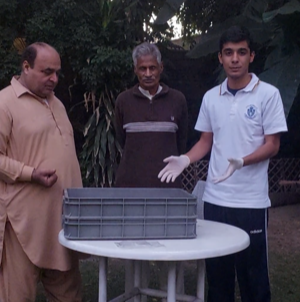1st Farmer Mealworm Farming Batch: A Journey of Learning and Progress
The launch of our first farmer mealworm farming batch marked a significant step toward introducing sustainable and profitable agricultural practices. This pilot batch consisted of five trays, each containing approximately 1,300 newly hatched mealworms, roughly weighing around 200 grams. While initially hesitant due to unfamiliarity with the process, the farmers gained confidence and skills through a comprehensive week-long training program. The training emphasized the lifecycle of mealworms, optimal feeding practices, and maintenance techniques, leaving the farmers well-equipped to manage this innovative farming venture.
Challenges and Adaptations
Despite the preparation, the first batch brought unexpected challenges. The lifecycle progression from larvae to pupae, and eventually beetles, occurred faster than anticipated. This rapid transition resulted in three trays being completely converted to beetles before the mealworms could mature for farming purposes.
To address this, we acted swiftly by isolating the beetles and their eggs for future use. This measure allowed us to establish a self-sustaining system, reducing the dependency on purchasing new mealworms and ensuring continuous production. The remaining trays were successfully managed by keeping check a constant check if mealworms had started to convert to pupa which yielded mature mealworms, later providing both economic and practical benefits.
Tackling Feed Security Through Mealworms
One of the most significant achievements of this batch was the use of mealworms as a reliable and nutrient-rich feed source for livestock. One tray of mealworms was dedicated to poultry feed, providing both hens and cattle with a high-protein diet that supported their health and productivity.
In rural and arid agriculture regions such as Chakwal, livestock is integral to livelihoods and animal feed-security is a critical issue. Seasonal shortages, varying market prices, and unreliability of suppliers leads to inconsistent feed. Mealworm farming offered a sustainable and cost-effective solution to these challenges, by producing mealworms, farmers ensured a steady, high-quality feed supply, enhancing both livestock resilience and crop productivity. The nutrient-dense nature of mealworms strengthens animals’ immune systems by reducing susceptibility to diseases and ensuring better overall health.
Mealworms and Sustainable Agriculture
An added benefit of mealworm farming lies in its by-products. The frass (worm excreta) produced during the farming process proved to be an excellent organic fertilizer. Farmers in Chakwal incorporated the nutrient-rich frass into their agricultural practices allowing improvements in soil fertility and crop yields.
In water-scarce regions like Chakwal, the ability to produce high-quality organic fertilizer locally is truly a game changer. Frass not only reduces reliance on expensive chemical fertilizers but also enhances the soil’s water-retention capacity, making it ideal for drought-resistant farming.
Results and the Road Ahead
Of the five trays in the first batch, two were successfully sold, generating nearly three times the initial investment. This demonstrated the strong market demand for mealworms. Meanwhile, one tray was used for poultry feed, ensuring a reliable, nutrient-rich feed supply for the farmers’ livestock and addressing feed security in a sustainable way.
For future cycles, the farmers are planning implement new strategies to enhance the farm’s productivity. One tray will now be dedicated exclusively to breeding beetles, ensuring a consistent supply of eggs for subsequent batches. The remaining trays will focus on producing mature mealworms, balancing economic and practical uses.
Conclusion
The first batch of mealworm farming served as both a challenge and a learning experience, revealing the immense potential of this practice. Mealworm farming emerged as a powerful tool to address critical issues like feed security and sustainable agriculture, particularly in drought-prone regions.
A locally produced, nutrient-rich feed livestock and organic fertilizer that enhances soil health is a comprehensive solution to many of the challenges faced by rural farmers. This project not only highlights the versatility of mealworms but also underscores their importance in building a sustainable future for farming communities in Pakistan and beyond.

